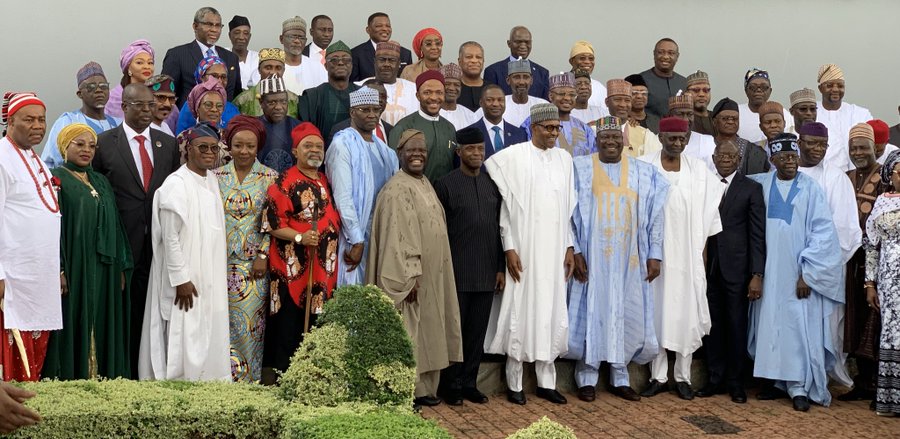President Muhammadu Buhari on Wednesday swore-in members of his cabinet for the second term.
The event which took place at the Presidential Villa on Wednesday was jigjlighted by the announcement of portfolios for each of the ministers.
Former Lagos Governor Fashola retained his Works and Housing ministry, but the ppwer segment was clipped off from him. It was assigned to Saleh Mamman of Taraba State.
The president retaindd himself as minoster of petroleum, while former Governor of Bayelsa State Timipire Sylva, was named minister of state in that ministry, which supervises the oil industry -the country’s main foreign exchange earner.
Buhari charged his new ministers to work towards ensuring better Nigeria and a country the citizens would be proud of.
Below is a full list of the new ministers and their assigned portfolios:
1. Uchechukwu Samson Ogah (Abia) – Minister of state for mines and steel development
2. Mohammed Musa Bello (Adamawa) – Minister of FCT
3. Godswill Akpabio (Akwa Ibom) – Minister of Niger Delta
4. Dr Chris Ngige (Anambra ) – Minister of labour and productivity
5. Sharon Ikeazu (Anambra) – Minister of state for environment
6. Adamu Adamu (Bauchi) – Minister of education
7. Ambassador Mariam Kategu (Bauchi) – Minister of state for industry, trade and investment
8. Timipre Sylvia (Bayelsa) – Minister of state for petroleum
9. George Akume (Benue) – Minister of special duties
10. Mustapha Baba Shehuri (Borno) – Minister of state for agriculture
11. Godwin Jeddi Agba (Cross River) – Minister of state for power
12. Festus Keyamo – (Delta) – Minister of state for Niger Delta
13. Ogbonnaya Onu (Ebonyi) – Minister of science and technology
14. Osagie Ehanire (Edo) – Minister for health
15. Clement Agba (Edo) – Minister of state for budget and national planning
16. Otunba Adeniyi Adebayo (Ekiti) – Minister of industry, trade and investment
17. Geoffrey Onyeama (Enugu) – Minster of foreign affairs
18. Isa Ibrahim Pantami (Gombe) – Minister of communication
19. Emeka Nwajuba (Imo) – Minister of state for education
20. Suleiman Adamu (Jigawa) – Minister of water resources
21. Zainab Ahmed (Kaduna) – Minister of finance
22. Mohammad Mahmoud (Kaduna) – Minister of environment
23. Sabo Nanono (Kano) – Minister of agriculture
24. Major Bashir Magashi (Kano) – Minister of defence
25. Hadi Sirika (Katsina) – Minister of aviation
26. Abubakar Malami (Kebbi) – AGF and minister of justice
27. Ramatu Tijani Aliyu (Kogi) – Minister of state for FCT
28. Lai Mohammed (Kwara) – Minister of information and culture
29. Gbemisola Saraki (Kwara) – Minister of state for transportation
30. Babatunde Fashola (Lagos) – Minister of works and housing
31. Olorunimbe Mamora (Lagos) – Minister of state for health
32. Mohammed Abdullahi (Nasarawa) – Minister of state for science & technology
33. Zubairu Dada (Niger) – Minister of state for foreign affairs
34. Olamilekun Adegbite (Ogun) – Minister of mines and steel development
35. Tayo Alasoadura (Ondo) – Minister of state for labour
36. Rauf Aregbesola (Osun) – Minister of interior
37. Sunday Dare (Oyo) – Minister of youth and sports
38. Paulen Tallen (Plateau) – Minister of women affairs
39. Rotimi Amaechi (Rivers) – Minister of transport
40. Mohammed Maigari Dangyadi (Sokoto) – Minister of police affairs
41. Saleh Mamman (Taraba) – Minister of power
42. Abubakar Aliyu (Yobe) – Minister of state for works and housing
43. Sadiya Umar Farouk (Zamfara) – Minister of humanitarian affairs, disaster management and social development
Photo: All 43 ministers in a group photograph with President Muhammadu Buhari.














